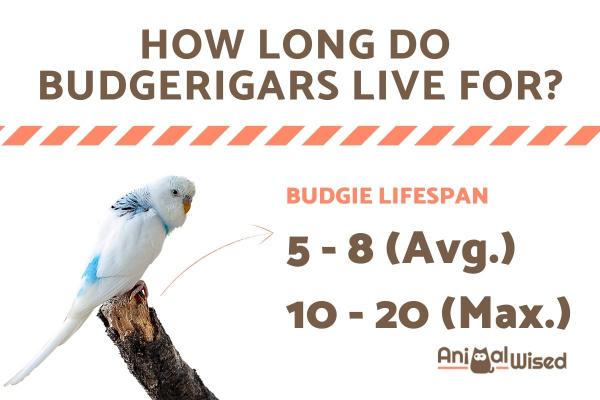
When it comes to choosing a pet, remember you're making a commitment to look after an animal for its whole life. If you live up to your responsibility, hopefully this life will be long and fulfilling. In general, small animals have a short life expectancy due to their increased metabolism, while bigger animals tend to live for longer. However, this is not always the case.
Parrots and cockatoos are famous for enjoying long lives if they're looked after properly. But what about their smaller relative, the budgie? Keep reading this AnimalWised article to find out how long do budgerigars live for?
Budgerigars lifespan
Parakeets are a type of small parrot and budgerigars are one of many genera which make up with group. Firstly, if you are wanting to know how long do budgies live, you will be pleased to know they are the longest living of all parakeets. The reason is genetic and it is believed to be due to the budgie having relatively little genetic manipulation over the years. Other larger and more feathered parrots such as the English parakeet have a shorter lifespan.
However, not all budgerigars are the same. How long a budgie will live depends various factors. One of the most important is whether it lives in the wild or is kept in captivity. More importantly in the domestic setting, the budgie's life expectancy will depend on the care the bird has received throughout its life.
A further determining factor is to do with their health. There are various illnesses which may cause a budgie's lifespan to be shortened. Protecting the budgerigar from these diseases requires proper hygiene, preventive medicine and other safeguards.
We also need to be very careful when it comes to housing our budgie. These animals are very fragile when living in a climate that is different from their natural habitat, so you should consult your vet at the slightest sign of a symptom.
How long do budgies live for?
Since budgies in captivity have better protection, better security in terms of resources and lack interaction with possible predators, there is a disparity in the lifespan of wild and captive budgies. Wild budgies do not have the protection of their guardians and their exposure to the elements makes them more vulnerable. Also, captive budgies may be bred in such a way that they have better genetic lineages.
For this reason, we have to differentiate between a wild budgie's lifespan and that of a captive bird:
Wild budgie: budgies in the wild will usually die naturally at 4 - 6 years of age.
- Budgie in captivity: when a pet budgerigar is well taken care of, their average lifespan is 5 - 8 years. However, if they are particularly fortunate, it is possible for a pet budgie to live up to 15 or even 20 years in rare cases. Of course there are many factors which will determine the longevity of an individual bird.
While the maximum lifespan of a budgie may be up to 20 years, it is important to know these are not likely and only occurs in the rarest occasions. We have seen some results claiming the oldest budgie alive reached 29 years, but it is difficult to find substantive evidence for it.
It is also important to note that, once a budgie develops into adulthood, they will not display significant differences in appearance. It is possible old age may make them more susceptible to disease, but essentially adult budgerigars of any age will have a very similar appearance.
Check out the differences between male and female budgerigars in our AnimalWised article to learn more about caring for these incredible birds.

How to help a budgerigar live longer
Once we adopt a budgerigar into our home, there is nothing we can do about their predisposition toward certain genetic diseases or issues. However, we can control some aspects which will affect the budgie's life expectancy:
Stop your bird from breeding regularly or at all. Since each nesting is an exhausting process, it takes its toll on the parents. Additionally, there are already a lot of budgerigar breeders and adding more to the population may not be good for bird communities in general as it adds additional strain to resources.
Act quickly if you spot what is known as continuous molting. It's normal for a budgerigar to molt its feathers twice a year, or three times at the very most. On particular occasions, generally caused by stress, this bird can continually pluck at its plumage. This process leads to considerable physical problems for the animal. Even when it is a regular molt, it's recommended to supplement the budgerigar's diet for the weeks of the molt with vitamins or a mixture of enriched seeds, prepared in advance.
- Make sure that your budgerigar doesn't have problems with mites or lice, which can lead to anemia. This involves ensuring the budgie has a clean cage and you promote their general hygiene.
- Provide enough food, but make sure it is of good quality. Vary their diet with fruit and vegetables suitable for parrots and do not give them too many treats.
Budgerigars are normal-sized green parakeets with a yellow head. As a species, they have gone through fewer cross breedings than many other parrot breeds. Maintaining this tradition of low interference, in theory, means they will live for longer. However, it is possible that two birds from the same family may have varying lifespans and we may never know why.
If you want to know how long do budgies live for, we need to know this answer depends on how well we meet the responsibility of their care.
If you want to read similar articles to How Long Do Budgerigars Live For?, we recommend you visit our Facts about the animal kingdom category.